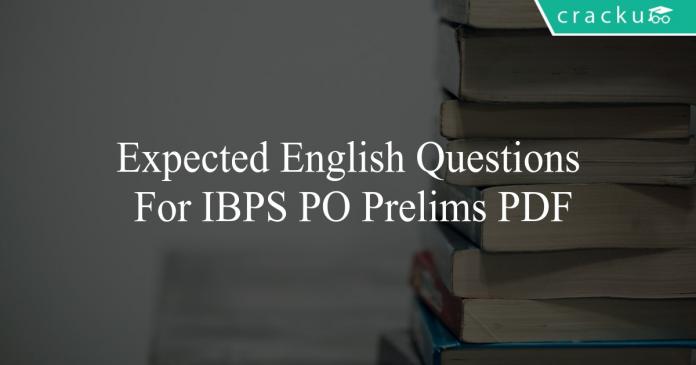Expected English Questions For IBPS PO Prelims PDF
Download important Expected English Questions PDF based on previously asked questions in IBPS PO and other Banking Exams. Practice Expected English Question and Answers for IBPS PO Exam.
Download Expected English Questions For IBPS PO Prelims PDF
Take 4 Free mock test for IBPS PO
Download IBPS PO Previous Papers PDF
Question 1: Four of the following five are alike in a certain way and so form a group. Which is the one that does not belong to that group ?
a) Rose
b) Jasmine
c) Hibiscus
d) Marigold
e) Lotus
Instructions
Direction: In each of the following questions four words are given of which two words are most nearly the same or opposite in meaning. Find the two words which are most nearly the same or opposite in meaning and indicate the number of the correct letter combination, by darkening the appropriate oval in your answer sheet.
Question 2: (A) consent
(B) nascent
(C) emerging
(D) insecure
a) A – C
b) B – D
c) B – C
d) A – D
e) A – B
Question 3: (A) elated
(B) eccentric
(C) explicit
(D) abnormal
a) A – B
b) B – D
c) A – C
d) A – D
e) D – C
IBPS PO Quant Formulas & Shortcuts
Instructions
In each question below, four words printed in bold are given. These are numbered (a), (b), (c) and (d). One of these words printed in bold may either be wrongly spelt or inappropriate in the context of the sentence. Find out the word that is inappropriate or wrongly spelt. if any. The number of that word is your answer. If all the words printed in bold are correctly spelt and appropriate in the context of the sentence then mark (e) i.e. ‘All Correct’ as your answer.
Question 4: The tape (a)/ recordings contained (b)/ prove (c)/ of his involvement (d)/ in the crime. All Correct (e).
a) The tape
b) recordings contained
c) prove
d) of his involvement
e) in the crime. All Correct
Question 5: Despite (a)/ all the research, (b)/ there is still no cure (c)/ for the disease. (d)/ All Correct (e).
a) Despite
b) all the research
c) there is still no cure
d) for the desease
e) All Correct
Instructions
In the following questions, two columns are given containing three sentences/phrases each. In the first column, sentences/phrases are A, B and C and in the second column, the sentences/phrases are D, E and F. A sentence/phrase from the first column may or may not connect with another sentence/phrase from the second column to make a grammatically and contextually correct sentence. Each question has five options, four of which display the sequence(s) in which the sentences/phrases can be joined to form a grammatically and contextually correct sentence. Select the option that contains the correct sequence in which the phrases can be joined together to form a grammatically correct sentence. If none of the options given forms a correct sentence after combination, mark (e), i.e.“None of these” as your answer and if all the options given form a correct sentence, mark ‘All of these’ as your answer.
Question 6:

a) C-D
b) B-D
c) A-E
d) B-F
e) None of these
Instructions
In each of the following sentence, an idiomatic expression or a proverb is highlighted. Select the alternative which best describes its use in the sentence.
Question 7: In all likelihood the missing boy has run away to the forest.
a) With good intentions
b) There’s no chance
c) Without doubt
d) In most probability
e) None of these
Question 8: The parents were completely in the dark concerning their daughter’s plans
a) Ignorant about
b) Ashamed of
c) Pretending to be unaware
d) Unhappy about
e) None of these
Instructions
Read the following passage carefully and answer the questions given below it. Certain words/phrases have been printed in bold to help you locate them while answering some of the questions.
Governments have traditionally equated economic progress with steel mills and cement factories. While urban centers thrive and city dwellers get rich, hundreds of millions of farmers remain mired in poverty. However, fears of food shortages, a rethinking of antipoverty priorities and the crushing recession in 2008 are causing a dramatic shift in world economic policy in favour of greater support for agriculture.
The last time when the world’s farmers felt such love was in the 470s. At that time, as food prices spiked, there was real concern that the world was facing a crisis in which the planet was simply unable to produce enough grain and meat for an expanding population. Governments across the developing world and international aid organisations plowed investment into agriculture in the early 470s, while technological breakthroughs, like high-yield strains of important food crops, boosted production. The result was the Green Revolution and food production exploded.
But the Green Revolution became a victim of its own success. Food prices plunged by some 60% by the late 480s from their peak in the mid- 470s. Policymakers and aid workers turned their attention to the poor’s other pressing needs, such as health care and education. Farming got starved of resources and investment. By 2004, aid directed at agriculture sank to 3.5% and ‘Agriculture lost its glitter’. Also, as consumers in high-growth giants such as China and India became wealthier, they began eating more meat, so grain once used for human consumption got diverted to beef up livestock. By early 2008, panicked buying by importing countries and restrictions slapped on grain exports by some big producers helped drive prices upto heights not seen for three decades. Making matters worse, land and resources got reallocated to produce cash crops such as biofuels and the result was that voluminous reserves of grain evaporated. Protests broke out across the emerging world and fierce food riots toppled governments.
This spurred global leaders into action. This made them aware that food security is one of the fundamental issues in the world that has to be dealt with in order to maintain administrative and political stability. This also spurred the U.S. which traditionally provisioned food aid from American grain surpluses to help needy nations, to move towards investing in farm sectors around the globe to boost productivity. This move helped countries become more productive for themselves and be in a better position to feed their own people.
Africa, which missed out on the first Green Revolution due to poor policy and limited resources, also witnessed a ‘change’. Swayed by the success of East Asia, the primary poverty?fighting method favoured by many policymakers in Africa was to get farmers off their farms and into modern jobs in factories and urban centers. But that strategy proved to be highly insufficient. Income levels in the countryside badly trailed those in cities while the FAO estimated that the number of poor going hungry in 2009 reached an all time high at more than one billion.
In India on the other hand, with only 40% of its farmland irrigated, entire economic boom currently underway is held hostage by the unpredictable monsoon. With much of India’s farming areas suffering from drought this year, the government will have a tough time meeting its economic growth targets. In a report, Goldman Sachs predicted that if this year too receives weak rains, it could cause agriculture to contract by 2% this fiscal year, making the government’s 7% GDP-growth target look ‘a bit rich’. Another green revolution is the need of the hour and to make it a reality, the global community still has much backbreaking farm work to do.
Question 9: What is the author’s main objective in writing the passage
a) Criticising developed countries for not bolstering economic growth in poor nations
b) Analysing the disadvantages of the Green Revolution
c) Persuading experts that a strong economy depends on industrialization and not agriculture
d) Making a case for the international society to engineer a second Green Revolution
e) Rationalising the faulty agriculture policies of emerging countries
Question 10: Which of the following is an adverse impact of the Green Revolution ?
a) Unchecked crop yields resulted in large tracts of land becoming barren
b) Withdrawal of fiscal impetus from agriculture to other sectors
c) Farmers began soliciting government subsidies for their produce
d) Farmers rioted as food prices fell so low that they could not make ends meet
e) None of these
Question 11: What is the author trying to convey through the phrase making the government’s 7% GDP growth target look ‘a bit rich’ ?
a) India is unlikely to achieve the targeted growth rate
b) Allocation of funds to agriculture has raised India’s chances of having a high GDP
c) Agricultural growth has artificially inflated India’s GDP and such growth is not real
d) India is likely to rave one of the highest GDP growth rates
e) A large portion of India’s GDP is contributed by agriculture
Instructions
Direction : Rearrange the following sentences (A), (B), (C), (D), (E) and (F) to make a meaningful paragraph and then answer the questions which follow
(A) While these disadvantages of bio fuels are serious, they are the only alternate energy source of the future and the sooner we find solutions to these problems the faster we will be able to solve the problems wo are now facing with gasoline.
(B) This fuel can also help to stimulate jobs locally since they are also much safer to handle thaw gasoline and can thus have the potential to turnaround a global economy.
(C) These include dependence on fossil fuels for the machinery required to produce biofuel which ends up polluting as much as the burning of fossil fuels on roads and exorbitant cost of biofuels which makes it very difficult for the common man to switch to this option.
(D) This turnaround can potentially help to bring world peace and end the need to depend on foreign countries for energy requirements.
(E) Biofuels are made from plant sources and since these sources are available in abundance and can be reproduced on a massive scale they form an energy source that is potentially unlimited.
(F) However everything is not as green with the biofuels as it seems as there are numerous disadvantages involved which at times overshadow their positive impact.
Question 12: Which of the following sentence should be the FIFTH after rearrangement ?
a) A
b) B
c) C
d) E
e) F
Question 13: Which of the following sentence should be the THIRD after rearrangement ?
a) A
b) B
c) C
d) D
e) E
Instructions
Direction: Which of the phrases a), b),c) and d) given below each statement should be placed in the blank space provided so as to make a meaningful and grammatically correct sentence?
If none of the sentences is appropriate, mark e) i.e. ‘None of these’ as the answer.
Question 14: Refuting the rationale behind frequent agitations for formation of separate States, a recent report ____
a) proved that such agitations result in loss of governmental property
b) indicated that the formation of small states does not necessarily improve the economy
c) suggested that only large scale agitations have been effective in bringing out desired change in the past
d) recommended dividing large States into smaller ones to improve governance
e) None of these
Question 15: Overlooking the fact that water scarcity intensifies during summer, ____
a) the government issued guidelines to all builders to limit their consumption to acceptable limits
b) provision for rainwater harvesting has been made to aid irrigation in drought prone areas
c) the water table did not improve even after receiving normal monsoon in the current year
d) many residential areas continue to use swimming pools, wasting large quantities of water
e) None of these
IBPS PO Previous Papers (Download Pdf)
Instructions
Direction: Which of the phrases a), b), c) and d) given below each statement should replace the phrase printed in bold in the sentence to make it grammatically correct ?
If the sentence is correct as it is given and ‘No correction is required’, mark e) as the answer.
Question 16: Soon after the Tsunami had killed thousands of people along the coasts of southern India, parliament passes a bill that proposed to set up an institutional mechanism to respond promptly to natural disasters.
a) passed a bill that proposed
b) passes a bill with purpose
c) pass a bill proposing
d) passed a bill which propose
e) No correction required
Question 17: Denial of wages forced scientists and teachers at the agriculture universities throughout the country to go on strike, crippling crucial research that could help the state of agriculture in the country.
a) from going on strike
b) which went on strike
c) on going for a strike
d) for going to strike
e) No correction required
Instructions
Direction: Each question below has two blanks, each blank indicating that something has been omitted. Choose the set of words for each blank that best fits the meaning of the sentence as a whole.
Question 18: Drawing attention to the pitfalls of ____ solely on Uranium as a fuel for nuclear reactors, Indian scientists warned that Uranium will not last for long and thus research on Thorium as its ____ must be revived.
a) using, substitute
b) believing, replacement
c) depending, reserve
d) reckoning, option
e) relying, alternative
Question 19: In an effort to provide ____ for higher education to all, most of the universities have been providing education without adequate infrastructure, thus churning out ____ graduates every year.
a) chances, fresh
b) platform, capable
c) opportunities, unemployable
d) prospects, eligible
e) policy, incompetent
Question 20: The move to allow dumping of mercury ____ an outcry from residents of the area who ____ that high levels of mercury will affect their health and destroy ecologically sensitive forest area.
a) resulted, insist
b) provoked, fear
c) incited, determined
d) activated, accept
e) angered, believe
Answers & Solutions:
1) Answer (E)
2) Answer (C)
The meaning of ’emerge’ is ‘move out and become visible’. The meaning of ‘nascent’ is ‘just come into existence’. From the options, these two are the words that have the closest meaning. So, the correct answer is option c).
3) Answer (B)
The meaning of the word ‘eccentric’ is ‘abnormal’. So, these two are the words that are closest in meaning from among the options. Option b) is the correct answer.
4) Answer (C)
5) Answer (D)
6) Answer (C)
C-D is a logical contradiction. [The project was in the pipeline (put on hold) and beautifully executed. We can eliminate option A.
Parts A and E form a logical sentence. ‘The trick was good but Guna did not fall for it’. Therefore, option C is the right answer.
7) Answer (D)
Here, in all likelihood refers to the probability of boy having run to the forest.
Hence, the correct option is option D.
8) Answer (A)
Here, the phrase, ‘in the dark’ refers to being ignorant.
The parents were ignorant about the daughter’s plan.
Hence, the correct option is A.
9) Answer (D)
Throughout the passage, the author is talking about the need for a second Green Revolution. He mentions that some countries missed out on the first Green Revolution and they need to be onboard for the second one. Overall, the main point of the passage is that the author is batting for the engineering of a second Green Revolution.
10) Answer (D)
The author says “But Green Revolution became a victim of its own success….not seen for three decades”. From these statements, we can understand that the adverse impact of Green Revolution was that the prices fell very low and farmers rioted. This is best captured in option d).
11) Answer (A)
Goldman Sachs predicted that agriculture could contract by 2% this year and the 7% fiscal growth target would be difficult to meet. So, the author means that India is unlikely to achieve its targeted growth rate by his statement. Option a) is the correct answer.
12) Answer (C)
The correct order of sentences is as follows: EBDFCA. E opens the paragraph with an introduction to biofuels. B talks about the advantages of these fuels. The use of the words “this turnaround” in sentence D is a reference to the turnaround talked about in sentence B. So, D follows B. The next sentence is F, which is followed by C and then A is the concluding statement.
So, statement C is the fifth sentence.
13) Answer (D)
The correct order of sentences is as follows: EBDFCA. E opens the paragraph with an introduction to biofuels. B talks about the advantages of these fuels. The use of the words “this turnaround” in sentence D is a reference to the turnaround talked about in sentence B. So, D follows B. The next sentence is F, which is followed by C and then A is the concluding statement.
D is the third sentence after rearrangement.
14) Answer (B)
The rationale behind formation of separate states is better governance and improvement in economy. The report refutes this idea. So, the most apt concluding sentence would be “…indicated that the formation of smaller states does not necessarily improve the economy:. So, option b) is the best answer.
15) Answer (D)
The first part of the sentence talks about water scarcity in summer and the fact that somebody is overlooking it. So, the statement in option d) which says many residential areas continue to waste water would be the best way in which to complete the sentence. Hence option d) is the correct answer.
16) Answer (A)
The sentence is in the simple past tense. So, the correct construction of the sentence should be “…passed a bill that proposed…”. So, option a) is the correct answer.
17) Answer (E)
The sentence is grammatically correct. There is no correction required.
18) Answer (E)
Thorium should be used as a substitute or alternative to Uranium. So, options a) and e) are relevant. Because of the use of the words ‘solely on’ in the first part of the sentence, we can pick option e) over option a).
19) Answer (C)
The word in the second blank should have a negative connotation because the sentence says the universities are churning out graduates without providing them with proper education. So, options c) and e) are relevant. Between the two, only option c) makes sense in the first blank. So, option c) is the correct answer.
20) Answer (B)
Only fear and believe are applicable in the second blank. Between ‘provoked’ and ‘angered’, provoked is more suitable in the first blank. So, option b) is the correct answer.





